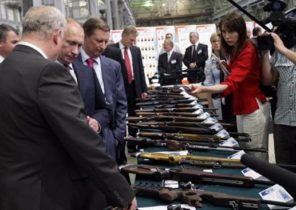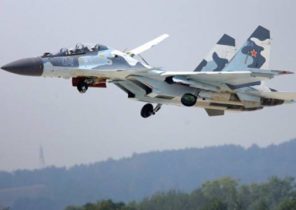The increase in China’s Arsenal and its nuclear weapons has not received the deserved attention because of the threat that the actions of Beijing to represent the interests of the United States and for strategic stability. The actions of Beijing undermine the ability of the United States to deter attacks against the United States, deterrence for its allies and protect its interests. Strategic stability occurs when both or all parties involved in the process of containment, do not have significant reasons to achieve excellence. At the end of the cold war, strategic stability was achieved for the United States and Russia. However, strategic stability is not reached with China for three reasons.
First, it is estimated that currently China has in its Arsenal of about 300 nuclear warheads, but due to the lack of transparency on the part of Beijing we can assume that the nuclear Arsenal of Beijing, in fact, much more. This month in China there were calls to increase its nuclear Arsenal to a thousand strategic warheads, not to mention nuclear weapons and medium-range missiles or other types. While in the United States organized a “strategic vacation” (strategic holiday), people’s Republic of China used the opportunity to increase their arsenals, their capacity in cyberspace and in the field of conventional arms. If you perform all these major steps to create strategic systems and capabilities in cyberwarfare and conventional weapons, will be inevitable following conclusions:
Here’s what he said on this occasion, Casper Weinberger, defense Secretary in the administration of President Ronald Reagan: “When we increase the Arsenal, they build up an Arsenal, when we stop, they build up the Arsenal”.
The growth of the Chinese Arsenal cannot be separated from other evidence of Chinese expansionism. For example, the Chinese are expanding their base in Djibouti and in Gwadar and its network of alliances, including through the initiative “One belt, One road” and “debt diplomacy” (diplomacy debt). This may also include the creation of international institutions to replace existing ones, as well as carrying out aggressive intelligence operations.
These measures show that China does not intend to maintain the status quo, and is, in fact, a revisionist power and, in addition, he tries to quickly make changes. All this does not augur well for strategic stability.
The most concern is the fact that increasing China’s capacity could allow it to achieve parity with the United States or even superiority over them, which will result in an intense arms race. China’s actions represent a threat to strategic stability. To maintain strategic stability requires the modernization of the us strategic systems, including missile defense and conventional weapons. In If you do not do this, it may be a direct and vital strategic challenge for the security of our allies and our own security.
Second, pay attention to itself and form building, with China’s potential. Always prone to secrecy, the Chinese have tried to keep secret build up its nuclear forces because they do not want to provoke a premature reaction from the United States and its allies. Even more reprehensible that the Chinese secret way to “prepare the battlefield” (preparing the battlefield) because they want to be able to harm the United States through other, non-nuclear means. These non-nuclear attack vectors include the cyberspace, control of space, the domination in the field of supply chains, economic impact, technological mastery of standard G5.
In addition, more attention is the Chinese focused on the issues of artificial intelligence, soft power and illegal access to American knowledge, intellectual property, Finance and technology to facilitate growing power of China. As a result of such actions the United States can be significant damage — in fact, it can be almost equivalent to the damage from a massive nuclear attack and attempt to force to give the political leaders of the United States in a crisis or limited war without using nuclear weapons. China may take one or more cyber attacks on the electric network, and on the ability of the United States to restore and repair their electric systems after a major cyber attack.
This is likely to be a direct attack in the cyberspace, however, the damage from it may be unintentional due to the unintended consequences of attacks against other targets. Moreover, the risks of using electromagnetic pulses (electromagnetic pulse) vs electric networks in the United States are also real. The vulnerability of the us electric grids under the influence of electromagnetic impulses — in the case of intentional attacks on networks, cyber attacks or increased solar activity — as well as the ability to restore the electrical network as a result of such actions is the question that needs to be solved.
Thirdly, China rejects arms control in practice and in principle. While China is not going to unilaterally reduce its Arsenal, to limit it or to enter into negotiations on arms control. It is an alarming sign, indicating that perceptions of the United States on the basis of stability in the relations between the great powers are only their own, and not shared by China. The main purpose of arms control is that it contributes to the strengthening of stability in relations between States.
If a state voluntarily waives a certain class of weapons or limits, it is thus demonstrating to other States that his ambitions are limited and that it supports strategic stability. By joining the regime of arms control, China can show that he shares the values of arms control and is committed to confidence-building measures which contribute to stability. In addition, it shows that there is a power that support the status quo.
In fact, it would allow China to signal their peaceful intentions and would produce a stabilizing effect on those States that are concerned about the growing power of Beijing. The fact that China rejects arms control, a concern and suggests that, first, it is a revisionist power, and, secondly, that he did not intend to restrict himself doing increase its Arsenal.
The presence of such conditions means that it is hardly possible to achieve strategic stability. China likely will seek to achieve superiority, which is a destabilizing factor, whereas the United States must ensure that this will never happen and should prepare ourselves to return to the arms race. Given the unprecedented expansion of the people’s Republic of China, the United States needs to respond through modernization of their capabilities to deter the Chinese from the possibility to create a threat to mainland America, the us military, and also for the obligations towards the allies. It is critically important steps in order to keep Beijing from the temptation to start the race and try to achieve parity or dominance that could eventually lead to the destruction of Washington’s ability to inspire trust and to the disintegration of alliances. And, finally, the United States should ensure that a serious effort is given to vulnerability and the possibility of significant harm to the economy and population on the mainland as a result of application of non-nuclear means.







